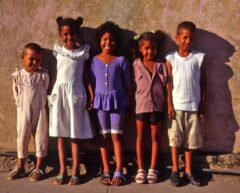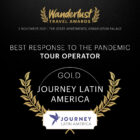Finding Inspiration in Brazil’s Slums

Journey Latin America's former staff, James Mulally shares his experience of working in one of Brazil's most deprived areas.
During my year in northeast Brazil I was based in Maceió, the state capital of Alagoas. There, the weather is perfect year-round, the food is delicious, and the beaches, an unbroken white-sand stretch along miles of coastline, are breathtakingly stunning. But Maceió doesn’t quite share the beauty of its natural surroundings.
It doesn’t have the charming colonial buildings, the years of history or the quaint markets that can be found elsewhere in northeast Brazil; in fact, it is very poor, run down and dysfunctional, and the effects of ingrained poverty can be seen in almost every neighbourhood. My first impression was to feel overwhelmed, but I felt committed to stay. Over time, it was the friendships and the warmth of local people that gave rise to my favourite memories from the city, and one in particular that I would like to share.
One Tuesday morning soon after I had returned from a traumatising experience in Argentina renewing my visa, I met a small shabbily dressed man with a podgy belly and unkempt facial hair wearing Crocs (an idiosyncratic choice in a nation of flip-flop wearers). He introduced himself as Pastor Jadiel Junior and invited me into his rusting VW van for a ninety-minute drive through rush hour to Rio Largo, where he runs an orphanage. This is on the outskirts of the city and you can tell. Roads become dramatically worse, along with buildings and living standards, until you find yourself driving through puddles two feet deep, through neighbourhoods that stagnate in darkness without streetlights or policing.
A wall separates Boyd O’Neal Male Orphanage from Maceió’s airport and the radar tower hums and turns behind the jackfruit tree on the football pitch. The wall has to be regularly re-plastered and Jadiel often keeps guard until the early hours to prevent local thieves from entering at night and stealing from the orphanage. It’s not the safest part of town.
At any one time, Jadiel’s small orphanage is home to up to 15 young men and boys who are either orphaned or from very challenging backgrounds – the kind where leaving the family home is a better, safer alternative than staying. Their stories are often tragic but the orphanage is very well run and feels like home. Indeed, for them, that is exactly what it is.
The boys are aged from 6 to 17: when they reach 18 they must leave and make their own way. At Boyd O’Neal, they are well fed, taken to school each morning and collected in the afternoon by Jadiel and encouraged to learn new skills such as carpentry and mechanics. Sports are played all the time – of course, football is a clear favourite with most of the boys. Some struggle to accept the rules around which their new routines revolve, resorting to old defence mechanisms - fighting and throwing stones, violent responses they have grown up with. Others make the most of the opportunity and get good grades at school. All of them look out for each other like brothers.
At first when I began to visit on Saturdays I could tell that many of the boys had reservations about me. Why was a white guy from another country coming to visit them? What did he want? It took a while for me to learn all their names - and even longer to find out how to beat them in a football match. Sometimes I would spend a day there in the blazing sun and find my money missing from my bag when I came to catch the bus home, but weeks became months and distrust gradually turned to mutual respect and friendship.
One thing was constant throughout those months, and that was the huge Saturday lunch of rice, beans and chicken. Aside from playing football, I would also lead some English classes and creative workshops using language and art to convey positive messages. With charity work, it can be easy to think only of the more material factors such as money, education and health, but I felt what the boys most needed was love, whether in the form of a hug, someone to talk to or a simple smile. It was frustrating, hard sweaty sun-burning work at times but Boyd O’Neal quickly became one of my favourite places in Maceió, and its impact stays with me to this day. There is a lot of poverty and hardship in Maceió but if you look a little bit deeper, there are some very special people, doing very special things in small ways that often go unnoticed. I am still grateful to Jadiel for allowing me to join in his work and to share my time with the boys he cares for so very much.
Tailor-made holidays
Flexible, custom-made holidays to Latin America created to match your exact requirements: our tailor-made itineraries are as unique as the clients for whom they are designed.
Design my tripPapagaio
Your edit for Latin American inspiration
Our exciting range of articles on Latin America explore everything from iconic destinations and lesser-known cultural gems to delicious traditional recipes. You’ll also find exclusive travel tips, first-hand client reviews and the chance to get your personal questions answered by our travel experts.
View Extraordinary Inspiration






































